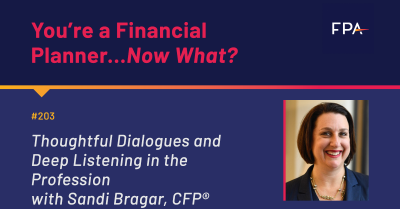
Do you think you’re a good listener? How about a “deep listener?” Even if you say yes, we guarantee that you can learn a lot from our guest on the latest episode of YAFPNW.
Sandi Bragar, CFP® and partner at wealth management firm Aspiriant, has just about perfected the art of listening and creating meaningful dialogues with clients. Sandi and Matt discuss what deep listening entails, why the first meeting with a client is important, and much more.
The client experience and first meetings
When does the client experience begin? You might think it’s when they sit down to talk to you or when they first enter your office. However, it starts before they’re even technically a client. Whether they find you through a Google search or thanks to a referral from a friend, that’s when the client experience starts. And that’s where we need to start making our clients feel comforted, secure, and heard. That’s how long and fruitful relationships with clients begin.
“We want to make sure that they know off the bat that we're there for them, that they're important as individuals and as people,” said Sandi. “We're there to serve them.”
The first meeting with a new client is the most important and the most exciting, Sandi said. Her three-step approach helps to build a trusting relationship with clients and allows her to learn what they want, what their values are, and how she can help them. Letting clients share their emotions, explaining what the planning process will cover, and in-depth discovery is key to a first meeting.
Planners may think that asking questions and ticking off items on their agenda is the best way to glean information from clients, but that’s not the case. Framing questions the right way and deep listening are much more effective.
The art of deep listening
What is deep listening?
“To me, when you're not listening deeply, you're thinking more about what you're going to say next while the other person you're talking to is speaking,” said Sandi. “So, effectively you're not listening at all.”
And if you’re not really listening to your clients, you can’t have a productive conversation that will help the both of you.
Deep listening means having a curious mindset. You want to know all about this person or this couple. What’s important to them? What makes them tick? It also means asking broad, open-ended questions that spark great dialogue. “Who are the most important people in your life? What are you passionate about?”
Finally, deep listening goes beyond listening to words. It also means paying attention to a client’s body language, tone of voice, or level of engagement. Are they sitting up straight and talking a lot with their hands? Are they sitting rigidly with their arms crossed and avoiding eye contact?
Listening and paying attention gives you so much insight into relationships with your clients: if a meeting is going well based on their body language and words, how they’re feeling about the agenda, what their values are, and so on.
Helping clients by paying attention
Deep listening is essential to being a good planner. And it can be really tough keeping your personal opinions in check, as well as offering solutions to your clients right off the bat instead of listening. Truly listening takes practice, but it’s one of the best ways you can help your clients.
“Our job isn't to know all the answers. And there might be situations that we're in that make us uncomfortable when we ask questions,” said Sandi. “But getting outside of your comfort zone will allow you to grow that much faster and be a much better planner sooner.”
Learn more about deep listening, Sandi’s career, and asking clients the right questions by tuning in to the full episode
What You’ll Learn:
- How Sandi began her career
- What Sandi does at Aspiriant
- What the client experience entails
- The importance of the first meeting with a client
- Framing conversations and creating dialogues
- What “deep listening” means
- Gauging interest and success with clients
- Struggles as a new planner
- Working with new planners
Show Notes:
In this episode of YAFPNW, Matt Fizell, CFP®, and Sandi Bragar, CFP®, discuss:
- Her work at Aspiriant
- “Honoring the man who forever changed the financial planning profession” MarketWatch on Dick Wagner
Follow Sandi on LinkedIn and on Twitter at @sandibragar.